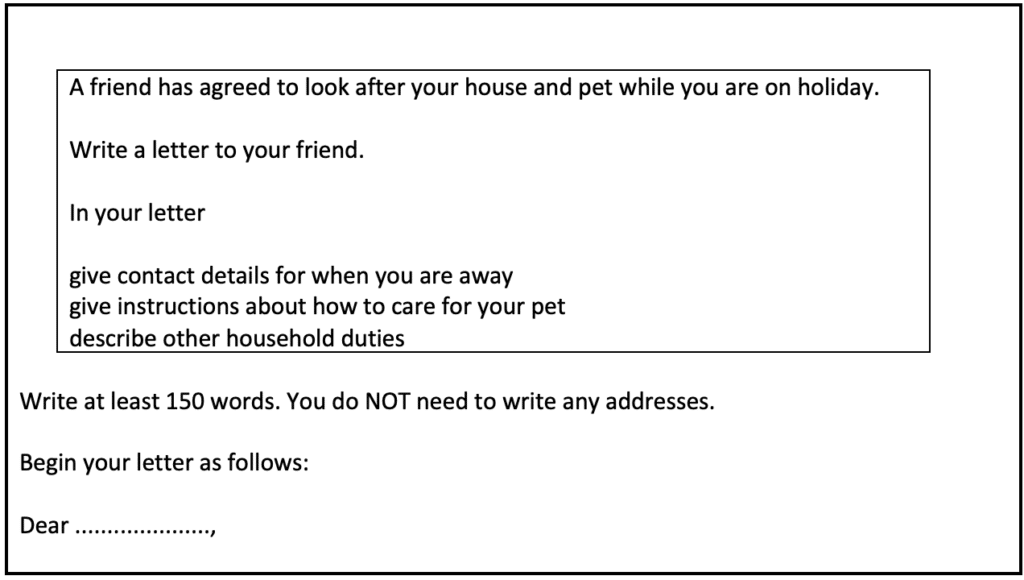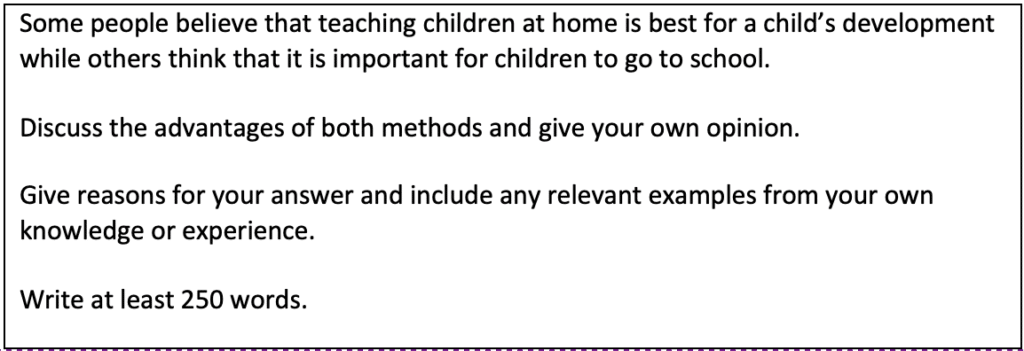
Do you need help with the IELTS writing section?
In this post, we will look at what you need to know about the IELTS writing section in the General Training test so that you can be ready for success on test day.
1) Know the format
You are expected to complete two tasks in 60 minutes. It’s important to note that you will need to manage the time for each task yourself.
2) Know what Task 1 requires
You will be given a situation and will need to write a letter that is transactional in nature – in other words, you may need to ask for something or respond to someone asking you for something. The recommended time for Task 1 is 20 minutes and you are expected to write at least 150 words. The task may require the letter to be formal, semi-formal, or informal. Some typical letter types are:
– Complaining – Asking for information/help
– Inviting – Accepting/refusing an invitation
– Applying for a job – Apologising
– Making a request – Giving information
– Giving advice – Making suggestions
Here’s a sample task

See more examples of IELTS Writing tasks
3) Know the assessment criteria for Task 1
Generally speaking, examiners will be looking at how well you responded to the task, how you organised your ideas, and to what extent you used appropriate and accurate grammar and vocabulary.
The four assessment criteria are:
Task Achievement – did you complete the task instructions?
Cohesion and Coherence – did you organise the information in logical order, and did you link your ideas?
Lexical Resource – did you use a good range of vocabulary without too many spelling mistakes?
Grammatical Range and Accuracy – did you use the correct tense(s)?
It’s a good idea to download the public band descriptors to look at what is required for your desired band score.
Download the IELTS Writing Task 1 band descriptors
4) Think before you write!
Don’t be tempted to start writing straight away! It’s important to take 2-3 minutes thinking about what you’re going to write. Ask yourself the following questions:
Q1. What type of letter is it?
E.g., complaint, apology, invitation, etc.
Q2. Who am I writing to?
Depending on how well you know the person, you will be able to decide on how formal the letter should be.
Q3. Why am I writing?
Again, this will help you decide on the level of formality for the letter you are going to write, as well as the kind of vocabulary you should use.
Q4. How many parts are there to the question?
This is really important because it will form the organisation of your letter. You must answer all the bullet points to achieve a higher band score in Task Achievement. It’s also a good idea to follow the order of the bullet points when you write to make your writing more coherent.
5) Know what Task 2 requires
You are required to write an essay on a given topic. The recommended time for this task is 40 minutes and you are expected to write at least 250 words.
You will be presented with an argument, point of view or problem and given a task or asked a question. The questions can vary, e.g., ‘To what extent do you agree?’, ‘What are the advantages or disadvantages of…?’, ‘Who do you think should be responsible for…?’, ‘What are the problems of…?’, ‘What are some solutions to …?’
Here’s a sample task:

6) Know the assessment criteria for Task 2
What the examiners are looking for is very similar to Task 1. The main difference is in the first area:
Task Response – did you answer the question? Did you extend, expand, and support your main ideas? Is your position clear?
Cohesion and Coherence – did you use paragraphs to organise your ideas, and did you link your ideas?
Lexical Resource – did you use a good range of vocabulary without too many spelling mistakes?
Grammatical Range and Accuracy – did you use the correct tense(s)? Did you use a mixture of simplex and complex structures?
7) Plan your essay
As with Task 1, don’t start writing until you’ve had time to think and plan your essay – 2 to 3 minutes. Make sure you understand the task by separating the topic from the task. Ask yourself:
Q1. Can I talk about one side, or do I have to talk about both sides?
Read the instructions carefully as this will tell determine the answers. E.g., ‘Discuss the advantages and disadvantages of…’, ‘Do you agree or disagree?’.
Q2. Is there a direct question I have to answer?
Some tasks have one or more direct questions, and you must respond to them. E.g., ‘Who do you think is responsible for…?’
Q3. Can I expand and extend my main ideas?
Choose ideas that you can support by giving reasons, examples, as well as results or consequences. It is better to have fewer ideas with expansion rather than lots of ideas with little or no support.
8) Check your work
In reality, you don’t have time to draft or rewrite your letter or essay. If you do have time, spend a minute or two looking for spelling mistakes and any mistakes you typically make when you write.
9) Look at sample and model answers
This is a great way to get a better understanding of what you need to produce to get your desired band score. When you look at model answers, pay attention to the organisation of the writing, the words and phrases used, and make a note of these to use in your own writing.
Take a look at some IELTS Writing sample answers
10) Practice!
As with all parts of the IELTS test, make sure you get plenty of practice. Show your writing to a teacher or a friend who is also preparing for the test – you can give each other feedback based on the assessment criteria.
Good luck!
Ready to take your IELTS test? Find your nearest IELTS test centre and book your test.



0Comments